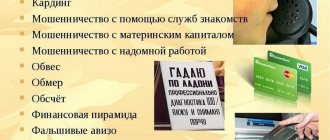There are a lot of offers on the Internet to profitably buy a popular product, download music or software for free, and also meet a lonely beauty or handsome man. But free cheese, as you know, only comes in a mousetrap. By playing on human greed and gullibility, attackers easily take possession of their victims’ money. The victim immediately has a question: how to punish scammers on the Internet? This is not so simple, because the worldwide computer network allows you to maintain anonymity in many illegal matters. But there is no need to despair and think that the situation is hopeless. Competent actions in case of fraud significantly increase the chances of catching the scammers and returning the stolen money.
What is internet fraud?
There are a lot of forms and types of deception on the Internet. Like any fraud in the real world, in the virtual one it pursues the same goal - enrichment at the expense of other people. But if outside the Internet scammers try to get cash or property from gullible citizens, then online their goal is bank card and account data. With this information, they will be able to withdraw the victim's money. Fraudsters do this through a series of transfers to fake accounts, which allows them to confuse their tracks and complicate their own identification.
The main tricks and, therefore, types of fraudulent activities on the Internet are related to:
- Dating sites.
- Trading on classifieds sites and social networks.
- Creation of fictitious online stores.
- The promise of quick money.
Pretending to be sellers of popular products, scammers claim unprecedentedly low prices and special promotions. Of course, the promotion period is about to end and you need to hurry to become the owner of a product, the quantity of which is limited. A gullible buyer, having transferred money to scammers, either receives nothing or receives a product whose quality characteristics do not at all correspond to those declared.
Dating sites, social networks and Skype use other schemes. Their essence comes down to gaining the trust of the victim, convincing her of your sincere feelings, and then asking for help in a difficult situation. Of course, we are always talking about financial assistance. Having received the money, the scammer simply disappears. Sometimes they use more sophisticated schemes, bringing acquaintance to marriage, and then getting divorced and receiving half of the “jointly acquired” property.
A separate column is blackmail with various intimate photos and correspondence. This is why dating on Skype is so popular among criminals of this kind, because intimate videos can be recorded there in real time, providing a way to blackmail the victim.
Punishment for fraud: list of articles of the Criminal Code of the Russian Federation
Illegal activities related to the withdrawal of funds through deception fall under a number of articles.
- Art. 159. Fraud
- Art. 182. False advertising that does not correspond to the truth
- Art. 171. Illegal business activity.
- Art. 200. Deception of consumers
- Art. 199. An entrepreneur evades paying taxes.
Using the list of these articles, you can put psychological pressure on the scammer and this will be a powerful argument through which you can get your money back.
How to avoid becoming a victim of scammers on the Internet?
Before wondering what to do if you are deceived by scammers, you need to know and use methods to prevent deception. The basic rules of internet safety are:
- Don't look for a quick get rich. All promises of easy and quick earnings, passive income with fabulous interest rates and similar desirable but unrealistic fairy tales only lead to the loss of the income that you already have. All such offers end in nothing more than luring people into a financial pyramid.
- Don't trust your friends online. Even if your real friend, whom you have known for a long time, suddenly writes to you on a social network that he found himself alone in the country or had an accident and needs money, it is worth calling back and talking to him in person. The fact is that attackers often hack accounts on social networks and send similar messages on behalf of friends. Giving in to emotions, trusting people rush to help a friend, not realizing that they are only helping a fraudster.
- It is necessary to protect access to Internet banking as much as possible. To do this, it is important to come up with strong passwords that cannot be guessed based on logic or minimal knowledge about the owner of this account.
- Use a VPN. This is very important when connecting to unfamiliar computer networks, in particular, to free Wi-Fi in a cafe. If this network is controlled by a fraudster, he can easily extract personal information from the visitor’s computer.
Compliance with these rules will protect your data and make it much more difficult for fraudsters to do their job. In most cases, they will not contact an attentive and competent person, preferring to look for a less demanding network user.
Have a question for a lawyer? Ask now, call and get a free consultation from leading lawyers in your city. We will answer your questions quickly and try to help with your specific case.
Telephone in Moscow and the Moscow region: +7
Phone in St. Petersburg and Leningrad region: +7
Free hotline throughout Russia: 8 (800) 301-39-20
How to protect your card from fraudsters?
There are several simple rules, the observance of which is precisely the way to protect your card from fraudsters and does not allow or sharply reduces the likelihood of theft of funds:
- do not tell anyone the CVV code, expiration date and PIN code of your card; even bank employees do not have the right to request this information from you;
- do not write down the PIN password on the back of the card, remember it or keep it on a piece of paper in your outerwear pocket;
- do not keep the card in public places in plain sight and in front of cameras, for example, by placing it on the table, do not hand it over to strangers;
- cover up the CVV code on the card with a corrector, remembering in advance, this is not prohibited, but it increases the protection significantly;
- do not use a salary card for online purchases, get a duplicate one and deposit small amounts on it or accept transfers to it;
- If it is possible to set a limit on withdrawals, use this option and set up two-factor authentication with a password and SMS.
Remember that in most cases the cause of a data leak is the owner himself, so when someone on the phone tries to find out “the three numbers on the back,” end the conversation.
If you realize that you have said too much, do not be lazy to immediately block the card, and we have already talked about how to return the money transferred to the card.
What to do if you become a victim of Internet scammers?
The first and most important action to take if fraud is suspected is to block your bank card. This must be done immediately as soon as her data reaches an unfamiliar or suspicious person. Even if no money was withdrawn from the card and no manipulations were made with it, you should play it safe by contacting the bank. It is better to change the card than to be left without money, because how to punish scammers on the Internet and return money is very difficult.
Depending on the bank’s policy, you can apply to block cards either during a personal visit or by calling the bank’s call center. At the same time, prompt handling is very important. It is advisable to call the bank immediately after the fraudster has obtained the card details. Maximum - within 24 hours. Lateness may be grounds for the bank to refuse to conduct an investigation.
Where to go first?
If the connection with the scammers has not yet been severed, start with a motivated complaint demanding a refund. Do not resort to insults and personalities, just correctly describe your position (you are not going to put up with fraud) and all your further steps (contacting the bank and law enforcement agencies), immediately add your card number and telephone number for a refund. If it doesn't help, proceed to the next steps.
All the answers on the Internet boil down to logical advice - contact the police or prosecutor's office regarding fraud. This is all good advice, but the first step is to contact your bank. This should be done as soon as possible, as a quick response will help increase the chances of a refund. If the transfer was made from an electronic wallet (Qiwi, Yandex, WebMoney) - write to their support. Inform the specialist about the fact of transferring funds to scammers and describe the essence of the situation.
- If the payment was made automatically and without your participation, indicate to the specialist that your card has been hacked, request that it be blocked and declare your desire to submit an application for a refund. After submitting such a request, the bank's security service must begin checking your transfer.
- If you personally transferred money, but the fact of fraud was discovered, immediately call the bank’s support and tell them about the details of the transfer (to whom, where and for what reason the money went). Keep in mind that banks are reluctant to consider refund cases if the client personally confirmed the transfer. Declare your desire to write a written application at the bank branch for a refund. There are not many chances, but if a large amount was transferred, it is worth a try.
- It also happens that the operation is carried out with the participation of official payment systems. For example, a transfer through the Yandex.Money service will be indicated by the symbols YM or YM. In this case, you need to additionally write to the support of this payment system with a statement of fraud.
The main difficulty in this whole situation is the speed of transfers. Now transactions from card to card or by phone number are performed almost instantly, and the law prohibits banks from debiting money from the recipient’s account without his consent. The bank may see the fact of fraud - but it’s not so easy to write off money from the swindler’s account and return it to you.
The deceived person will have a good chance of canceling/freezing the transfer if the operation remains in the “In Progress” status. Depending on the recipient's details, the money can take up to 1-2 business days.
Where to report scammers?
Fraud is a serious criminal offence. Therefore, if you become a victim of scammers, you need to immediately file a police report. This should be done during a personal visit to the police station at your place of residence, but you can also send an electronic appeal to department “K” of the Ministry of Internal Affairs of the Russian Federation. This is a special unit that searches for criminals in the field of information technology.
In a situation where scammers cheated you out of money on the Internet using their website, you must not forget to file a complaint about this portal in Google or Yandex. Justified complaints will be grounds for blocking this site. Of course, this will not allow you to return the money, but it will save other people from the encroachments of scammers.
Deception using spam mailings
This type of deception is the simplest, and is intended primarily for inexperienced Internet users. The “divorce” scheme is implemented in this way:
- A person receives an SMS on their phone or a message on VKontakte, Odnoklassniki, Instagram or another popular social network. It contains information such as “You are the winner of a huge giveaway” and asks you to follow the attached link for detailed instructions on how to claim your money.
- After switching to a fraudulent resource, the user must provide a number of personal data or make a transfer of a certain amount, which is allegedly charged for processing the winnings.
Despite the primitiveness of this outdated scheme, many gullible citizens still fall for it. Spam about victories in fake lotteries and notifications of payments from the state is distributed through email, instant messengers and social networks.
Is it possible to get money back from online scammers?
You can often hear that trying to get your money back is futile. However, it is not. Banks, of course, do not want to cover customer losses, which often arise through the fault of the customers themselves. But in Russia there is a law “On the National Payment System”, according to which the bank is obliged to return the stolen money if a statement of fraud and theft was filed within 24 hours. In this case, the bank will conduct an investigation. He has a month to do this. The client will be able to receive his money only if the investigation proves that the money was not transferred by the client voluntarily or due to his failure to comply with security rules when using Internet banking.
That is, getting money back (especially if we are talking about a large amount of money) is only possible if it was stolen due to gaps in the bank’s security system.
How to recognize a scammer?
1. Intrusive calls at any time of the day.
There is a known case where a fraudulent broker treated a woman this way for several months before she transferred her money. Remember: a professional and honest broker or financial trader will never impose his services over the phone. Clients look for a good specialist themselves. 2. Calls come from a mobile or hidden number. Keep in mind that a serious brokerage company always has a single telephone number - federal or local.
3. The promise of fabulous profits from invested funds in a short time - 10–20% or more per week or month. Moreover, no broker can guarantee 100% profit. Investing is always a risky activity.
4. Refusal to provide the website address of the brokerage company. Lack of information about her on the Internet. Or there is no information on the company’s website about the owner of the company, legal address or contact information.
5. Refusal to provide license information or lack thereof. Every organization that professionally carries out transactions in financial markets and with financial instruments using borrowed funds is required to have a license1. You can check whether a company has a license on the website of the Central Bank of the Russian Federation.
If a broker company is registered abroad and operates without a license from the Central Bank of the Russian Federation, it is an offshore organization operating outside the legal framework of our country. After signing an agreement with such a broker, if your rights are violated, you will not be able to defend your interests on Russian territory.
6. The broker refuses to meet in the office and conclude a brokerage agreement. It offers to quickly open an account without checking your documents and assures that it is enough to create a personal account on the website.











